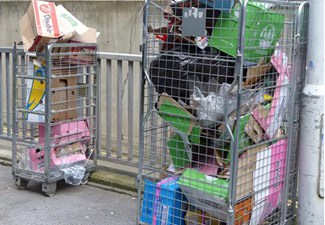The exemption of council-run commercial waste collection services from VAT is a useful selling point, according to updated guidance from the Waste & Resources Action Programme (WRAP).
The government-backed organisation reminds councils of the advantage of not having to levy VAT in its revised Commercial Recycling Collections Guide. The guide explains that council trade waste customers do not have to pay Value Added Tax (VAT) on the services provided.

This exemption is in contrast to the private sector which has to levy VAT although customers can often claim this back.
Written by WRAP and consultants Ricardo-AEA, the updated guidance, issued last week, notes that: On 9th February 2011, HM Revenue and Customs wrote to all local authorities to confirm that commercial waste collection services provided by local authorities are outside the scope of VAT. This is a useful selling point which is used by many local authorities.
Aimed at local authorities (as well as their private and third sector partners) the guide is designed to help them to determine, implement and optimise efficient and effective commercial recycling collection services. It includes examples of good practice and an overview of relevant legislation alongside evidence-based examples to assessing and improving performance.
The report covers all aspects of commercial recycling collections from setting out a business case, to understanding the composition of the waste collected, the things to be considered when rolling out a service such as the type of vehicles used and the transfer and treatment of the collected materials.
It notes that commercial recycling collections are increasing in the UK with more local authorities considering the benefits of either implementing a new service or expanding an existing one. A survey undertaken by WRAP in 2012 found that approximately 68% of all councils in England offer residual waste collections and 49% provide a recycling service to commercial premises. Of those offering a recycling service the range of materials collected varies but similarly to household services glass, paper, card and cans are among the most commonly collected.
Costs
Generating income is one of the main reasons given for local authorities offering commercial recycling services.
WRAP explains in the report: Local authorities are able to recover all the costs associated with providing a commercial waste/recycling service. In addition, under section 95 of the Local Government Act 20034 an authority may set up a wholly council owned trading company to deliver commercial waste/recycling services. Offering a comprehensive recycling service will help protect income generated from residual waste customers who may demand recycling services as well and wish to use a single supplier. There are opportunities for authorities collecting dry recyclables from commercial customers to maximise income from the sale of these materials.
Some councils are choosing to set up wholly-owned trading companies under the Teckal exemption, such as Cheshire East council (see letsrecycle.com story). However this has come under fire from some private waste sector firms who claim it creates an unfair playing field.
Barriers
Related Links
There are a number of key barriers to encouraging SMEs to recycling which are outlined in the WRAP report. These include potentially relatively low volumes of recyclable materials, difficulty demonstrating cost savings as a result of the low volumes and a lack of time, resources and cash flow.
The misuse of household services, particularly by micro-businesses, was another barrier highlighted. A 2010 survey by Defra revealed that 41% of English micro businesses use household services to dispose of and recycle their waste and as a result they may be reluctant to pay for a commercial service. This can be reduced, WRAP believes, through the introduction of permit schemes at HWRCs or by introducing commercial waste and recycling provisions at the centres where possible.











Subscribe for free